

REPUBLIC OF MOLDOVA
• Official name: Republica Moldova (Republic of Moldova)
• Location: Eastern Europe
• International organisations: Commonwealth of Independent States, Council of Europe,
Organisation for Security and Co-operation in Europe, United Nations, World Trade Organisation
• Borders: Romania, Ukraine
• Coastline: None
• Land area: 33,843 Km2
• Population: 4,100,000
• Annual GDP (PPP) per capita: US$2,300 (2009 CIA estimate). World ranking: 149. On this ranking Moldova is
the poorest country in Europe.
• Ethnicity: Moldovan 65%, Ukrainian 14%, Russian 13%, Gagauz (Turks) 5%. (Moldovans are in fact
Romanians.)
• Languages: Moldovan and Russian are the official languages (Moldovan is identical to Romanian). 5% speak Gagauz,
a Turkish dialect.
• Religion: Almost the entire population are Orthodox Chistian. There is a small
Jewish minority.
• Form of government: Parliamentary democratic republic. Moldova is divided into nine
counties, the municipality of Chisinau and two autonomous districts: Stinga Nistrului
(Transnistria) and Gagauzia. Transnistria is de facto independent under Russian protection.
• Capital: Chisinau
• Constitution: The
Constitution of the Republic of Moldova came into effect on 28 July 1994. A
new constitution
is being drafted.
• Head of state: The President, chosen by the legislature for a four-year term. The
president's functions are largely ceremonial.
Nicolae Timofti
has been President since 23 March 2012.
• Head of government: The Prime Minister, appointed by the President. The
Prime Minister is the leader of the largest party in the legislature and is accountable to it.

• Legislature: Moldova has a unicameral legislature, the
Parliament (Parlamentul), which has 101
members, elected for four-year terms by proportional representation.
• Electoral authority: The Central
Election Commission administers national elections. News on Moldovan elections can be found at
Democracy.md.
• Freedom House 2011 rating: Political Rights 3, Civil Liberties 3
• Transparency International Corruption Index: 29% (112 of 178 countries rated)
• Reporters Without Borders Press Freedom 2010 Index: 84% (53 of 178 countries rated)
• Heritage Foundation Economic Freedom 2010 Index: 54.4% (124 of 179 countries rated)
Political history
The territory which is now Moldova is the eastern half of the mediaeval Romanian
principality of Moldavia, which came under Ottoman rule in the early 16th century. It
was ceded to Russia in 1812 and remained part of the Russian Empire until 1918, while
retaining its Romanian language and identity. In 1918 the territory, then known as
Bessarabia, was awarded to Romania by the victorious allies.
In 1940 the Soviet Union demanded the return of Bessarabia and Bukovina, and
the Romanians were powerless to resist. In 1941, however, Romania joined Germany's
attack on the Soviet Union and reclaimed the lost territory. In 1944 Soviet forces
recaptured it and in 1947 it officially became the Moldovan Soviet Socialist Republic.
In 1991 the Moldovans joined the other Soviet republics in declaring their
independence. It was widely expected that Moldova would choose to be re-united with
Romania, but instead the Moldovans have opted to retain their independence. This is partly because a
separate sense of Moldovan ethnicity developed during the decades of Soviet rule,
partly because of apprehension about the economic costs of unification with chaotic
post-communist Romania, and partly because the opposition of the Ukrainian, Russian
and Turkish minorities.
Independent Moldova has been plagued by ethnic divisions, made worse by meddling from the
Putin regime in Russia. In 1991 ethnic
Ukrainians and Russians declared an independent republic in the border region of
Transnistria under the protection of Russian tropps, and the Turkish Gagauz also declared their autonomy.
Transnistria now claims to be an independent state.

The dominant party in Moldova for much of the period since independence was the
Communist Party (PCRM), though there was little specifically communist about its
policies, apart from opposition to reunification with Romania. The PCRM ruled from 1998 to 2009, when disputed
elections led to riots in the capital and a political crisis which culminated in the resignation of the
Russian-backed Communist President, Vladimir Voronin, and fresh elections at the end of the year. These resulted in a victory
for the opposition coalition of the Liberal Democratic Party of Moldova (PLDM), the
Liberal Party (PL), the
Democratic Party of Moldova (PDM) and
Our Moldova Alliance (AMN). The PLDM leader
Vlad Filat became Prime Minister. At fresh elections in
November 2010, the ruling coalition was returned to office.
Freedom House's 2011
report on Moldova, says:
"Moldovais an electoral democracy... Domestic and international observers hailed the November [2010]
balloting as a substantial improvement over the 2009 elections, citing a more open and diverse media
environment, impartial and transparent administration by the Central Election Commission, and a lack
of restrictions on campaign activities... Corruption remains a major problem in Moldova, and high-profile
antigraft prosecutions under the PCRM government often appeared politicised... The media environment
improved following the 2009 change in government. In 2010, the public broadcaster, Teleradio-Moldova,
grew more impartial under new management... Although the constitution provides for an independent judiciary,
there has been evidence of bribery and political influence among judicial and law enforcement officials.
Long-standing concerns about abuse and ill-treatment in police custody were renewed in the aftermath of the
April 2009 protests."
Updated May 2012
|


